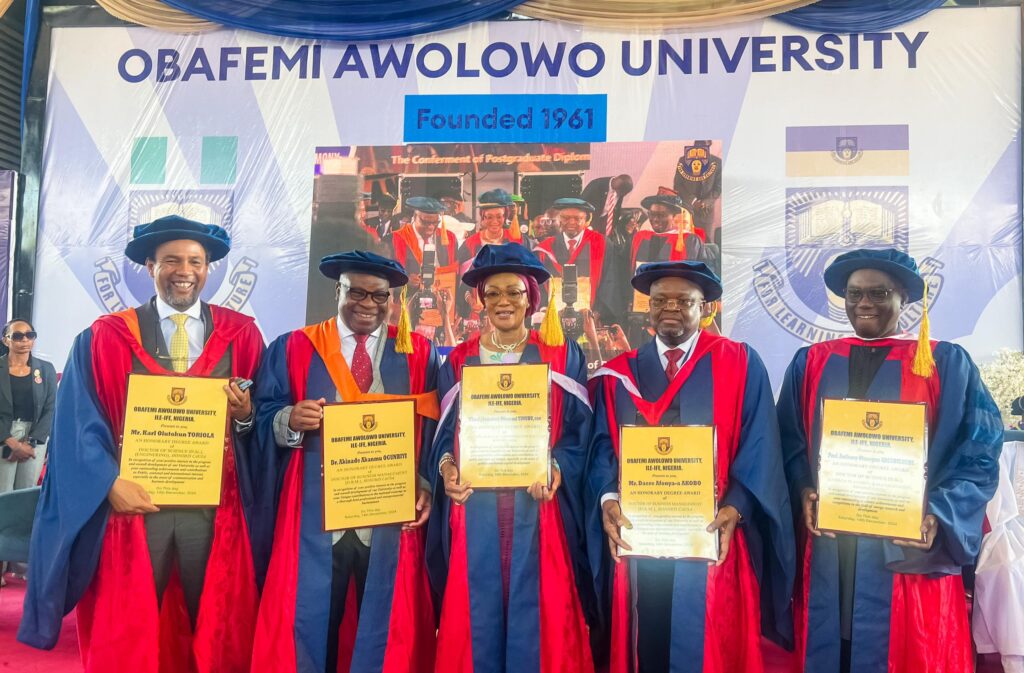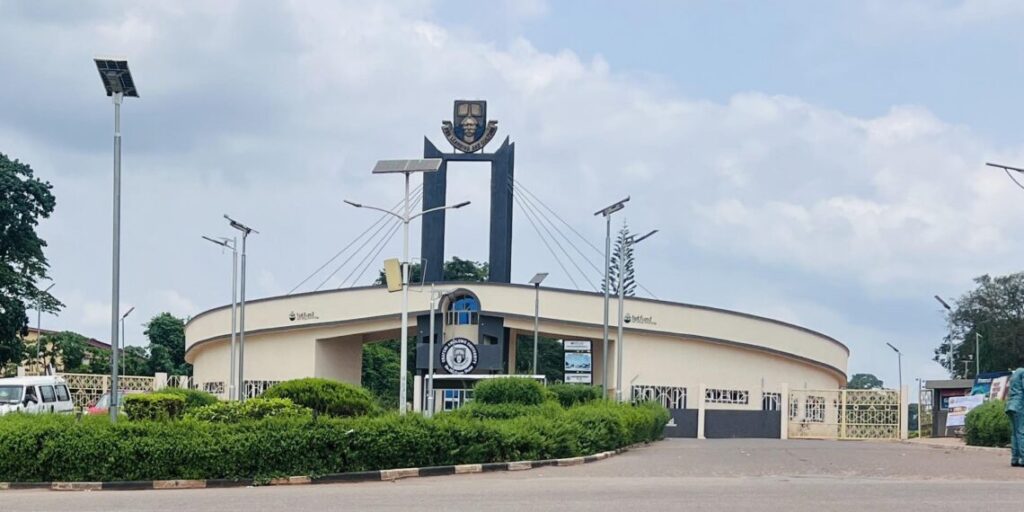When you walk through the gates of Obafemi Awolowo University (OAU) in Ile‑Ife today, it’s easy to admire the leafy campus and Bauhaus‑inspired architecture. Yet, beneath the iconic Arieh Sharon design lies a less visible but far more influential legacy: OAU’s pioneering role in nurturing Nigeria’s generation of tech entrepreneurs.
From early internet infrastructure to incubators like MIT iLab, the university quietly laid foundations for companies that now power Nigeria’s digital economy—including Jobberman, Cowrywise, Flutterwave, Moniepoint, Nairaland and more. This article explores how OAU earned that reputation, tracing its tech rise from the early 2000s to today, and highlighting key alumni who transformed Nigeria’s startup scene.
Table of Contents

A Digital Beacon Before Broadband Was a Word
Long before most Nigerian universities had stable internet, OAU’s Information Technology and Communications Unit (INTECU) invested heavily in connectivity. By linking buildings with fibre optics and wireless access, INTECU turned the campus into one of the first fully internet‑enabled sites in the country. By 2011, bandwidth had surged from 39 Mbit/s to over 180 Mbit/s. This made OAU virtually unmatched in digital access among peer institutions.
This foresight paid dividends. From 2003 to 2010, students found in Rotunda cybercafés and campus internet hubs their first taste of email, web design, and soon, early social media. That exposure ignited curiosity beyond lecture halls and changed many career trajectories.
Curiosity and Access Across Disciplines
Although tech wasn’t every student’s major, the ease with which undergraduates could access ICT facilities created cross‑disciplinary digital fluency. Students from non‑tech faculties enrolled in diploma courses at INTECU, or simply taught themselves in cyber cafés. As one former student recalls, the INTECU hall was “a living lab of ICT history,” filled with generations of PCs; it felt more like a hardware museum where theory met access.
Computer Science began attracting broader interest—what was once a niche course quickly became one of OAU’s most sought‑after offerings. With practical labs and early computer‑based testing for exams, the university steadily normalised digital workflows on campus.
Early Adopter of Computer‑Based Testing
Long before state‑of‑the‑art proctoring and online test platforms, OAU implemented computer‑based testing (CBT) for internal exams and post‑UTME screenings. Quick turnaround of marked papers, embossed watermarked results, and streamlined administration elevated the student experience—and reinforced OAU’s image as digitally sophisticated.
This tradition not only made OAU more efficient, but also familiarised generations of students with digital interfaces in high‑stakes environments—an intangible edge that shaped many tech founders early.
A Fertile Ground for Tech Founders
Today’s Nigerian tech ecosystem owes much to OAU alumni. Let’s look at a few notable names:
- Olalekan Olude (Jobberman), who studied Computer Science at OAU and co‑founded West Africa’s leading job portal. He later became COO of Jobberman before building on his executive path nationally and regionally.
- Abiola Olaniran, founder of Gamsole, a mobile game studio whose titles have amassed over ten million downloads across continents. His Computer Science degree at OAU and early tech exposure spurred his success in game development contests like Microsoft Imagine Cup and Samsung Developer Challenge.
- Florence Seriki, an early OAU alumna, launched Omatek Computers, becoming the first in Africa to assemble and manufacture PCs, keyboards, and servers locally—a groundbreaking move in the mid‑1990s.
- Funke Opeke, an electrical engineering graduate of OAU, founded Main One Cable Company, a major data and connectivity provider in West Africa, after studies at Columbia University.
- Gbenga Sesan, an Electronic and Electrical Engineering graduate, has become an influential social‑impact ICT entrepreneur and international thought leader Wikipedia.
Their successes exemplify an ecosystem where early access, digital literacy, and an entrepreneurial spirit coalesced.
Institutional Ecosystem: From INTECU to iLab
Several components helped foster tech innovation at OAU:
- INTECU: As noted, this ICT engine created infrastructure and capacity far ahead of its time.
- MIT iLab: OAU was the first sub‑Saharan African institution to pilot MIT’s iLab model, aimed at empowering African innovators with mentorship, project support, and global techno‑entrepreneurial standards.
- OAU Tech Week: Emerging as a student‑led initiative, the 2023 Tech Week event showcased seven student innovation teams. Judges awarded mentorship and seed support to the top five teams, strengthening academia‑industry ties and campus entrepreneurship culture.
Together, these initiatives built a supportive environment where ambition met structure and ideas became enterprises.
Culture & Community: Why OAU Stands Apart
Many Nigerian universities implement ICT labs, but OAU’s advantage lies in culture. A campus‑wide tech awareness, peer mentorship, collaborative energy across faculties, and early engagement with tech tools created a university‑wide momentum.
A 2022 research thesis found that the most successful Nigerian tech startups emerged when universities combined institutional support, access to finance, progressive policies, conducive culture, quality human capital, and market access. OAU embodied all of these, particularly in the early 2000s when most institutions lagged.

Alumni Reflections & Generational Shifts
Tech founders who graduated from OAU often speak of the university as the spark, not the sole fuel, but the ignition. One alumnus reflects:
“INTECU’s labs felt like a hardware museum … first‑, second‑generation PCs I’d only seen in books before.”
Meanwhile, administrators recount how cyber cafés like Rotunda attracted students hungry to learn digital skills outside formal lectures. For non‑ICT majors, those cafes became informal classrooms, shifting aspirations.
This shared story across generations explains why OAU’s alumni network includes tech visionaries who credit campus culture—and not just course content—for their trajectory.
Challenges & Triumphs: How OAU Kept Up Momentum
While INTECU and innovation labs gave OAU an early advantage, sustaining that edge wasn’t automatic. Over time, the university maintained forward momentum by:
- Continuously upgrading bandwidth and campus networks.
- Embracing digital administrative systems (e.g. CBT).
- Encouraging student‑led events like Tech Week.
- Supporting public‑private partnerships like MIT iLab.
- Providing inclusive access to non‑ICT students via diplomas, workshops, and open lab hours.
By aligning institutional policy with digital opportunity, OAU stayed ahead of superficial ICT investment.
OAU in the Broader Nigerian Tech Ecosystem
A 2021 comprehensive study of Nigerian tertiary institutions highlights gaps across the category: lack of finance, outdated curricula, limited industry connections, and weak entrepreneurial support. In contrast, OAU consistently featured among those top institutions making real strides.
Its blend of infrastructure, institutional will, alumni engagement, and student culture sets a benchmark. Others now emulate aspects—like Covenant University’s incubators and federal initiatives like the Nigeria Startup Bill—but OAU remains a singular case of early, sustained, multi‑disciplinary digital culture.
Looking Ahead: Building on OAU’s Tech Heritage
What’s next for OAU’s tech legacy? There are key opportunities:
- Strengthen alumni engagement: Encourage mentorship from high‑profile tech founders across campus.
- Scale student innovation programmes: Expand Tech Week into year‑round hackathons, accelerator tracks.
- Bolster industry partnerships: Drive collaborations like OPAY‑OAU scholarships or corporate‑sponsored labs.
- Bridge generational gaps in faculty: Ensure digital literacy among lecturers so they can engage Millennials and Gen‑Z effectively.
- Push for institutional policy alignment: Leverage national initiatives like the Diaspora BRIDGE Platform to deepen innovation ties .
By building on its founding vision, OAU can maintain its reputation not just as a tech incubator but as a tech university for Nigeria’s digital future.

Conclusion
For many, the phrase “OAU’s tech legacy: how Obafemi Awolowo University sparked a generation of Nigerian tech founders” isn’t just a headline—it’s a lived truth.
The university may be famed for its architecture or academic prestige, but its greatest enduring contribution is the ripple effect of its early tech environment. Today’s fintech platforms, mobile apps, social networks, and digital enterprises often trace back to that electric energy on campus: cafes buzzing with code, labs filled with curiosity, and alumni returning to give back.
OAU didn’t only graduate future tech founders—it quietly nurtured a micro‑ecosystem that continues to influence Nigeria’s digital narrative.
As Nigeria charts its course toward becoming a globally leading digital economy, OAU stands as an early, and still powerful, engine of that movement.
Join Our Social Media Channels:
WhatsApp: NaijaEyes
Facebook: NaijaEyes
Twitter: NaijaEyes
Instagram: NaijaEyes
TikTok: NaijaEyes








































